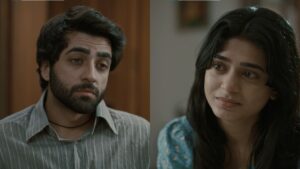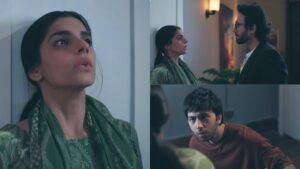In a candid conversation, Emmad Irfani opens up about the turning points in his career, from his corporate days to his meteoric rise in the entertainment industry. Known for his unforgettable roles in Cheekh, Jalan, and now Kabhi Main Kabhi Tum, the actor has built a reputation for portraying complex, multi-layered characters with ease.
From the moment he took the leap into acting to his thoughts on the future, Emmad shares insights into his journey and the people who helped shape it.
Your grasp on the craft and the range of your acting prowess in evident in all your recent projects including Cheekh, Jalan and now Kabhi Main Kabhi Tum. How do you keep bringing such different characters to life and make each one feel so unique?
I believe that with experience, you learn to work on your weaknesses and improve gradually. Over time, I have also become a firm believer in the idea that the role chooses you, rather than the other way around.
I have been fortunate to receive opportunities where, through my medium and craft, I get to live lives that are not my own. Bringing these characters to life, making them interesting, and portraying their inner conflicts is what truly inspires me.
Being the superstar that you are and now the internet’s latest sensation, people can’t stop talking about you, a lot of up-and-coming actors must look to you for inspiration. When did you first feel like this was your path, and what made you decide to go all in on acting?
In my opinion we change for two reasons: either inspiration or desperation. For me, interestingly, it has been a mix of both. Having worked in a corporate firm for three years, I wanted to do something I was passionate about, and ‘acting’ came as both an inspiration and a desperation to make something of myself and perhaps feel heard or seen.
So, after 11 long years, I must say I’m glad and proud that I took this decision and contributed in whatever capacity I could.
Your role in Kabhi Main Kabhi Tum is layered and intense—how did you approach preparing for a character like this? Was there one scene that pushed you to your limits?
Overall, I think that playing ‘Adeel’ pushed my limits. I wanted to leave no stone unturned and somehow be a servant of the script. The essence of who I was playing, the impact he has, and the conflicts he creates in the story had to come across as truthful and believable. That, to me, was my task as an actor. I used to be really curious about the primary objective—why he does what he does, this and that. But now, I just tell myself: he’s human. That’s it.
The scenes in the jail stand out for me. They’re the only moments where I get to show Adeel’s vulnerability, as he is a shattered man at that point.
Don’t want to put everyone to sleep talking about the prep, though.
Your co-actor Fahad Mustafa recently praised your work in an interview. What was the vibe like on set with him and the rest of the cast?
It is very generous and gracious of him. We gelled really well, and even the off-screen hours were spent becoming brothers on a subliminal level, I believe. He was an absolute superstar to work with in every sense.
Working with legends like Javed Sahab and Bushra Jee was truly a privilege. Hania, as ‘Sharjeena,’ has proven to be one of the best actresses we have. It was great working with her, even though our scenes together were quite challenging and unpleasant—haha!
Naeema… what a performer. The dynamic between “Adeel & Rubab” involved so many challenging and volatile situations in the script, and creating those was a lot of fun.
Badar Mehmood, the director, maintained a very relaxed vibe, which gave everyone the space to create.
Overall, KMKT is a journey that I will always cherish, and I am proud to have been a part of it.
The internet had a lot of opinions about Adeel, but we’re only interested in knowing yours. How would you describe him, does your opinion of him differ from the popular opinion?
Wow! How would I describe Adeel?
He is ferociously ambitious because this is what the world, his household, and society have made him. Striving to be the best—from his outlook to his image—the status-conscious man that he is, is a product of the values he was taught.
He created the main conflict in the story, and from there, things went downhill. He had his strengths, yet his weaknesses were the reason for his decline.
You’ve been such a standout on our digital covers, and we absolutely love the creative energy you bring every time. How was this experience different from the last one? And, of course, when can we expect you back? Goes without saying we’re already excited for the next time you grace our cover!
It’s always a pleasure being on your cover…so thank you for having me, the experience was smooth as always, really displays how ‘Niche Lifestyle’ is one of the leading publications we have in Pakistan. Truly appreciate our long association.









